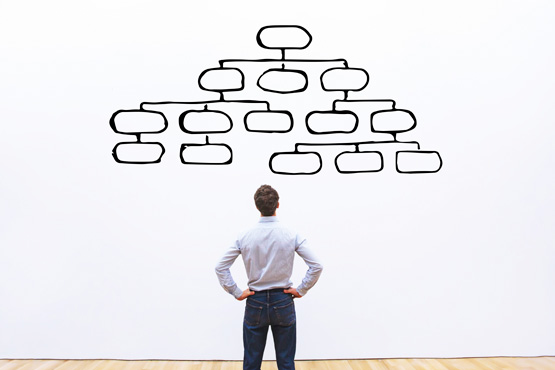We help our clients understand how to adapt their organization and the employee experience to the ever changing demands of their competitive market. We employ the latest thinking in how to use analytics and digital tools to ensure resources are organized and deployed for the greatest impact. We understand the challenges involved in managing changes so that they are adopted, owned by an energized workforce, and actually stick over time. We use insights gained over many years working with leaders and employees in every conceivable situation, coupled with the latest research in the psychology of change.

Organization Design
The structure of organizations is undergoing a transformation. Hierarchies are flattening, responsibilities are being devolved more deeply, workgroups are becoming more fluid, formal and informal networks are taking on greater significance, oversight is less about layers of management and more about data, analytics and dashboards. The role of leaders is changing. We focus on using objective data and socratic questioning to help you:
- Determine where work should be done and how, taking account of all the resources available in the modern economy and labor market, including fixed and variable resources
- Build formal structures and informal networks that optimize flexibility and accountability
- Calculate the most efficient and effective ratios of spans and layers
- Use collaboration networks to greatest effect
- Develop the role of leaders in driving performance and making your company a great place to work
- Establish measures and monitoring mechanisms to obtain rapid feedback loops that enable an adaptive high performance organization
Employee Experience
The world of work is changing, fast, making the future of work a topic of huge interest. What gets done, how, where and when is vastly different now from even a decade ago. And it will continue to change with new collaboration and communication tools, cheaper and better technologies that enable remote and flexible working, and very different approaches to workplace design. The combined effects of changing what, how, where and when, means new talent strategies are required that:
- Define new capabilities that are required, and where and how you will source them
- Identify new ways of thinking about the definition of “employee” in the open, gig, crowdsourced economy
- Determine the experience for all types of “employees” to maximize motivation, engagement, and productivity
- Increase talent retention, develop skills, and provide attractive career journeys
- Encourage health and wellness as part of the experience
- Develop a culture that is aligned with your strategy and values
We have the tools and experience to help you radically rethink how to do this.

Change Management
The stats are bad, and we all know it. Depending on which study you look at 60-70% of organizational initiatives fail to provide the expected benefits. It’s hardly surprising, given how difficult as individuals we find it to change (according to one study only 9% of people felt they were successful in implementing their new year resolution). Why is this?
- Plans are often inadequate for the task
- There is frequently a failure to adequately engage and motivate the people impacted by changes
- Communications can raise more questions than they answer
- Leaders move onto the next pressing issue too soon
- More often than not, the level of organizational energy and persistence to reinforce the changes declines over time
- The point of it all can get lost in the confusion of activity and with time
But 30-40% of initiatives are successful, and our approach:
- Builds on what has been shown to work over time
- Employs new tools for engaging, collaborating and communicating
- Uses the latest thinking to shape programs and increase levels of engagement and energy for driving the change
Whether it be a ‘big bang’ approach to change or building a culture of adaptability over time, we know how to help you deliver successful outcomes and keep them in place through a rich mix of approaches and tools, such as those developed utilizing the nudge theories of behavioral economics.
Executive Leadership Coaching
Leaders have complex responsibilities that bring with them correspondingly complex decisions to make. They also sit within structures with power dynamics that often militate against open and objective discussion between peers and with subordinates. For most, there is a personal element in how they want to shape their brand as leaders and how they wish to see their careers develop. We provide 1:1 coaching, based on bringing decades of experience working with senior executives to:
- Support their individual needs and aspirations as leaders
- Bring objective, outside-in perspective to discussions
- Help develop preparedness for the demands of current and potential future roles
- Provide advice and guidance on shaping and leading initiatives
- Strengthen the value of interactions with peers and direct reports
- Build a personal brand, built on individual aspirations and values


